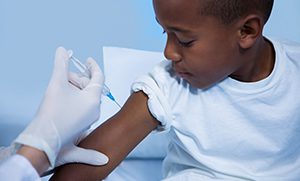By Adm. Brett P. Giroir, M.D.,Assistant Secretary for Health
August 2020
During National Immunization Awareness Month, the U.S. Department of Health and Human Services (HHS) is urging healthcare providers and parents to “catch-up to get ahead” on childhood immunizations.
The COVID-19 pandemic has led to worrisome declines in well-child visits and routine immunization rates. Although we have made progress to reverse this trend, without high vaccination rates there is a risk for outbreaks and further strain on our nation’s healthcare system.
As a pediatric critical care physician, I know all too well the devastating consequences that diseases, like whooping cough and measles, can have on children and their families. It is tragic to see a child become sick, or even die, from a disease that we can prevent with safe and effective vaccines. In our fight against the COVID-19 pandemic, we cannot let down our guard against preventable childhood diseases. Now is the time to get every child back on track with recommended vaccines.
To increase childhood immunization rates and reduce potential outbreaks of vaccine-preventable diseases before flu season, HHS is coordinating the “Catch-up to Get Ahead” effort. Together a number of government and private sector partners will enhance access to essential immunization services by:
- Increasing immunization opportunities by encouraging extended office and clinic hours for the administration of catch-up vaccines;
- Informing parents about COVID-19 safety precautions and practices in place in healthcare settings and encouraging them to take their children to get vaccinated; and
- Catching children up on their immunizations to mitigate pressures on our healthcare system when the influenza and SARS-CoV-2 viruses begin co-circulating in the coming months.
- Promoting the importance of childhood immunizations.
It’s imperative to make sure our children are vaccinated on time throughout their childhood before they are exposed to potentially life-threatening diseases. Vaccines are a safe and effective way to guard our children against 16 serious diseases, such as rubella, polio, and cancers caused by HPV.
Getting children back on track with recommended vaccines is safe, but there may be delays, as many children need to catch-up during this time. Additional precautions are in place in healthcare settings to prevent the spread of SARS-CoV-2, the virus that causes COVID-19. Most vaccines are also available at no or low cost to the parent. Parents should talk to their healthcare provider if they feel that cost is a barrier to getting their children vaccinated.
To learn more about vaccines and vaccine-preventable diseases, visit vaccines.gov.

